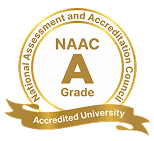Online Programmes Click here Vibrant Summit 2025 Click here

Online Programmes Click here Vibrant Summit 2025 Click here

Mechanism for Prevention, Prohibition and Redressal of Sexual Harassment
The university in pursuance of the regulations published by UGC “University Grants Commission (Prevention, prohibition and redressal of sexual harassment of women employees and students in higher educational institutions) Regulations, 2015” has constituted the Internal Complaints Committee (ICC) at Ganpat University for prevention, prohibition and redressal of sexual harassment of women employees and students at the university.
Objectives:
- To prevent discrimination and sexual harassment against women, by promoting gender amity among students and employees
- To lay down procedures for the prohibition, resolution, settlement and prosecution of acts of discrimination and sexual harassment against women, by the students and the employees;
- Deal with cases of discrimination and sexual harassment against women, in a time bound manner, aiming at ensuring support services to the victimized and termination of the harassment;
- Recommend appropriate punitive action against the guilty party to the competent authority of Ganpat University.
Important Definition
(I) Act means the Sexual Harassment of Women at Workplace (Prevention, Prohibition and Redressal) Act, 2013 (14 of 2013);
(II) Regulation means University Grants Commission (Prevention, prohibition and redressal of sexual harassment of women employees and students in higher educational institutions) Regulations, 2015
(III) Sexual harassment means-
(i) An unwanted conduct with sexual undertones if it occurs or which is persistent and which demeans, humiliates or creates a hostile and intimidating environment or is calculated to induce submission by actual or threatened adverse consequences and includes any one or more or all of the following unwelcome acts or behaviour (whether directly or by implication), namely:
- any unwelcome physical, verbal or non-verbal conduct of sexual nature
- demand or request for sexual favours
- making sexually coloured remarks
- physical contact and advances; or
- showing pornography
(ii) Any one (or more than one or all) of the following circumstances, if it occurs or is present in relation or connected with any behaviour that has explicit or implicit sexual undertones:
- implied or explicit promise of preferential treatment as quid pro quo for sexual favours;
- implied or explicit threat of detrimental treatment in the conduct of work;
- implied or explicit threat about the present or future status of the person concerned;
- creating an intimidating offensive or hostile learning environment;
- humiliating treatment likely to affect the health, safety dignity or physical integrity of the person concerned;
(IV) Aggrieved woman means in relation to work place, a woman of any age whether employed or not, who alleges to have been subjected to any act of sexual harassment by the respondent;
(V) Campus means the location or the land on which Ganpat University and its constituted institutional facilities like libraries, laboratories, lecture halls, residences, halls, toilets, student centres, hostels, dining halls, stadiums, parking areas, parks-like settings and other amenities like health centres, canteens, Bank counters, etc, are situated and also includes extended campus and covers within its scope places visited as a student of the institute including transportation provided for the purpose of commuting to and from the institution, the locations outside the institution on field trips, internships, study tours, excursions, short- term placements, places used for camps, cultural festivals, sports meets and such other activities where a person is participating in the capacity of an employee or a student of the concerned institute
(VI) Employee means a person employed by the Ganpat University or its institutes (regular/term/contract basis);
(VII) Student means a person duly admitted and pursuing a programme of study including short-term training programmes in the University;
Provided that a student who is in the process of taking admission in any of the institutes under the University, although not yet admitted, shall be treated, for the purposes of these regulations, as a student;
Provided that a student who is a participant in any of the activities in any of the institutes under the University where such student is enrolled shall be treated, for the purposes of these regulations, as a student;
(VIII) Third Party Harassment refers to a situation where sexual harassment occurs as a result of an act or omission by any third party or outsider, who is not an employee or a student of the University, but a visitor to the University in some other capacity or for some other purpose or reason;
Responsibilities of the Internal Complaints Committee (ICC)
(a) to provide assistance if an employee or a student chooses to file a complaint with the police;
(b) to provide mechanisms of dispute redressal and dialogue to anticipate and address issues through just and fair conciliation without undermining complainant’s rights, and minimize the need for purely punitive approaches that lead to further resentment, alienation or violence;
(c) to protect the safety of the complainant by not divulging the person’s identity, and provide the mandatory relief by way of sanctioned leave or relaxation of attendance requirement or transfer to another department or supervisor as required during the pendency of the complaint, or also provide for the transfer of the offender;
(d) ensure that victims or witnesses are not victimized or discriminated against while dealing with complaints of sexual harassment; and
(e) ensure prohibition of retaliation or adverse action against a covered individual because the employee or the student is engaged in protected activity.
Process for Making Complaint and Conducting Inquiry
The ICC shall comply with the procedure prescribed in these regulations published vide notification mentioned at serial 6 above for making a complaint and inquiring into the complaint in a time bound manner.
Process of Making Complaint of Sexual Harassment
An aggrieved person is required to submit a written complaint to the ICC within three months from the date of the incident and in case of a series of incidents within a period of three months from the date of the last incident. Provided that where such complaint cannot be made in writing, the Chairperson or any member of the ICC shall render all reasonable assistance to the person for making the complaint in writing.
Provided further that the ICC may, for the reasons to be accorded in the writing, extend the time limit not exceeding three months if it is satisfied that the circumstances were such which prevented the person from filing a complaint within the said period. Friends, relatives, colleagues, co-students, psychologist or any other associate of the victim may file the complaint in situation where the aggrieved person is unable to make a complaint on account of physical or mental in capacity or death.
Process of Conducting Inquiry
a) The ICC shall, upon receipt of the complaint, send one copy of the complaint to the respondent within a period of seven days of such receipt,
b) Upon receipt of the copy of the complaint, the respondent shall file his/her reply to the complaint along with the list of documents, names and addresses of witnesses within a period of ten days,
c) The inquiry has to be completed within a period of ninety days from the date of receipt of the complaint. The inquiry report with recommendations, if any, has to be submitted within ten days from the completion of the inquiry to the Director General. A copy of the findings or recommendations shall also be served on both parties to the complaint,
d) The Director General shall act on the recommendations of the committee within a period of thirty days from the receipt of the inquiry report, unless an appeal against the findings is filed within that time by either party,
e) An appeal against the findings or/recommendations of the ICC may be filed by either party before the Director General within a period of thirty days from the date of the recommendations,
f) If the Director General decides not to act as per the recommendations of the ICC, then it shall record written reasons for the same to be conveyed to the ICC and both the parties to the proceedings. If on the other hand, it is decided to act as per the recommendations of the ICC, then a show cause notice answerable within ten days shall be served on the party against whom action is decided to be taken. The Director General shall proceed only after considering the reply or hearing the aggrieved person,
g) The aggrieved party may seek conciliation in order to settle the matter. No monetary settlement should be made as a basis of conciliation. The institute concerned shall facilitate a conciliation process through ICC, as the case may be, once it is sought. The resolution of the conflict to the full satisfaction of the aggrieved party wherever possible, is preferred to purely punitive intervention,
h) The identities of the aggrieved party or victim or the witness or the offender shall not be made public or kept in the public domain especially during the process of the inquiry.
Interim Redressal
The concerned institute may –
- transfer the complainant or the respondent to another section or department to minimize the risks involved in contact or interaction, if such a recommendation is made by the ICC,
- grant leave to the aggrieved with full protection of status and benefits for a period up to three months,
- restrain the respondent from reporting on or evaluating the work or performance or tests or examinations of the complainant,
- ensure that offenders are warned to keep a distance from the aggrieved, and wherever necessary, if there is a definite threat, restrain their entry into the campus,
- take strict measures to provide a conducive environment of safety and protection to the complainant against retaliation and victimization as a consequence of making a complaint of sexual harassment.
Punishment and Compensation
1) Anyone found guilty of sexual harassment shall be punished in accordance with the service rules of the university if the offender is an employee,
2) Where the respondent is a student, depending upon the severity of the offence, the following punishment can be imposed:
- withhold privileges of the student such as access to the library, auditoria, halls of residence, transportation, scholarships, allowances, and identity card;
- suspend or restrict entry into the campus for a specific period;
- expel and strike off name from the rolls of the institution, including denial of readmission, if the offence so warrants;
- award reformative punishments like mandatory counselling and/or performance of community services.
3) The aggrieved person is entitled to the payment of compensation. The competent authority shall issue direction for payment of the compensation recommended by the ICC and accepted by the Director General, which shall be recovered from the offender. The compensation payable shall be determined on the basis of:
- mental trauma, pain, suffering and distress caused to the aggrieved person;
- the loss of career opportunity due to the incident of sexual harassment;
- the medical expenses incurred by the victim for physical, psychiatric treatment;
- the income and status of the alleged perpetrator and victim; and
- the feasibility of such payment in lump sum or in instalments.
Action against Frivolous Complaint
If the ICC concludes that the allegations made were false, malicious or the complaint was made knowingly it to be untrue or forged, or misleading information has been provided during the inquiry, the complainant shall be liable to be punished as per the UGC regulation. However, the mere inability to substantiate a complaint or provide adequate proof will not attract attention against the complainant. Malicious intent on the part of the complainant shall not be established without an inquiry in accordance with the procedure prescribed, conducted before any action is recommended.
Note: In case of any dispute or doubt under this document, the provisions of the ‘University Grants Commission (Prevention, prohibition and redressal of sexual harassment of women employees and students in higher educational institutions) Regulations 2015 dated 02.05.2016’ as mentioned in ref.
It is hereby notifying for information of concerned that the Director General has nominated following members in the internal committee, of Ganpat University for the period of three years.
Faculty Coordinators/Committee Members
Sr. No.
Category
Name
Contact No.
Email Address
1
Senior Professor – Women Faculty Member
Dr. Maurvi Vasavada
9979050918
maurvi.pandya@guni.ac.in
2
Two Faculty Members
Dr. Raksha K. Patel
9974019570
raksha.patel@guni.ac.in
Dr. Priyanka Pathak
priyanka.pathak@ganpatuniversity.ac.in
3
Two Non-Teaching Employees
Miss Meenushree Ranawat
7898826162
manager.hr@guni.ac.in
Patel Saraswatiben Natvarlal
9428459589
saraswatiben.patel@ganpatuniversity.ac.in
4
A member from amongst non-government organisations or associations committed to cause women or a person familiar related to sexual harassment
Dr. Ayeshaben Patel
9879541720
5
Students, if matter involves students
UG Student:
sshahpranali@gmail.com
Ms. Pranali shah
22032211117
GUNI-DCS
PG Student:
7283846110
kalpanakumariadarkhi22@gnu.ac.in
Ms. Kalpana Adarkhi
Enroll. no 22014191001
GUNI – UVPCE
Research Student:
maheka.shukla@gmail.com
Maheka Shukla
22276011008
GUNI- SKPCPER









.jpg)